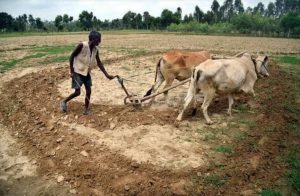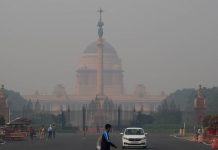 After the stupendous victory in recently held General Elections, the National Democratic Alliance, in its second inning is most likely to deliver some tenable solutions promised to the rural voters. After all, Modi and his advisors have now discerned that the threat to agriculture, if not addressed expeditiously will eat into its vote bank. The rural voters, keeping aside the understanding of their neglect by the government in the last five years and non-fulfilment of promises made in the manifesto of NDA in 2014 elections, favoured Modi over others. The fact that at many places, the villagers did not let the Bhartiya Janata Party candidates enter their villages to address public meetings is a testimony to the disdain of people for the local candidates. Albeit, the victory of the party with an increase in vote share reflects the faith people have reposed in only Mr. Modi, leader of the party.
After the stupendous victory in recently held General Elections, the National Democratic Alliance, in its second inning is most likely to deliver some tenable solutions promised to the rural voters. After all, Modi and his advisors have now discerned that the threat to agriculture, if not addressed expeditiously will eat into its vote bank. The rural voters, keeping aside the understanding of their neglect by the government in the last five years and non-fulfilment of promises made in the manifesto of NDA in 2014 elections, favoured Modi over others. The fact that at many places, the villagers did not let the Bhartiya Janata Party candidates enter their villages to address public meetings is a testimony to the disdain of people for the local candidates. Albeit, the victory of the party with an increase in vote share reflects the faith people have reposed in only Mr. Modi, leader of the party.It is common sense that the revival of rural income is important not from long term perspective but is imperative taking cognizance of the impending assembly elections in many states especially in Maharashtra, Haryana, Jharkhand and Jammu and Kashmir later this year.
Finally, the revival of agricultural income is vitally important to trigger growth in other sectors as agriculture is the growth engine of the economy. The automobile (both passenger and commercial) and FMCG (Fast Moving Consumer Goods) sector get immensely affected by the fluctuations in income of rural poor.
The rural voters have exceptionally high hopes from Modi government in second inning. Though Congress laid a lot of stress on the holistic development of rural India and announced fancy scheme NYAY (Nyuntam Aay Yojna) to woo the marginalised rural voters, it did not touch a chord with the target audience.
Modi was able to convince rural voters that only he can deliver and now, his second term is the litmus test of his credibility. Will he actually deliver what he promised? Let’s recall the proposed promises to the voters in hinterland. NDA in its 2019 Lok Sabha Election Manifesto had promised to provide short-term new agriculture loans up to Rs 1 lakh at zero percent rate of interest for 1-5 years. In its Sankalp Patra, BJP announced to spend Rs 25 lakh crore in next five years on agriculture development in next five years, if voted to power.
The party also pledged to expand the PM Kisan Samman Nidhi Yojna to all farmers. It was launched as an annual financial support of Rs 6000 to farmers owning less than 2 hectare. The Kisan Fasal Bima Yojna, that is compulsory for all is promised to be made voluntary in the 2019 manifesto. Evidently, the party think-tank had taken into consideration the bottlenecks in the implementation of the scheme at a mass scale.
The party also pledged to expand the PM Kisan Samman Nidhi Yojna to all farmers. It was launched as an annual financial support of Rs 6000 to farmers owning less than 2 hectare. The Kisan Fasal Bima Yojna, that is compulsory for all is promised to be made voluntary in the 2019 manifesto. Evidently, the party think-tank had taken into consideration the bottlenecks in the implementation of the scheme at a mass scale.

Now, let’s take a dig at the 2014 manifesto. Evaluation of the previous term of NDA under Modi provides that the farm income growth remained the slowest during 2014-19, where as Modi had announced to double the farm income by 2022. The public investment in agriculture registered a sharp decline during 2014-2019. The agriculture scientists claim that growth registered in gross value-added from agriculture had been lower during this period. Many of the schemes announced remained non-starter and PM Fasal Bima Yojna opened a panora box of corruption.
Talking to Tehelka, President of Bhartiya Kisan Union said that farmers despite all odds, farmers have voted for Bhartiya Janata Parties and its allies. With this strong mandate, the government can take decision for the welfare of farmers. He said that the procurement of the crops should be done in all parts of the country and the entire quantity should be procured. He added that farmers have to indulge in distress selling despite the Minimum Support Price. He reiterated the recommendations of Swaminathan Commission and formula of C2+50% to fix the price of commodities. He suugessted that not possible in one go, the price on the basis of Swaminathan Commission recommendation can be fixed in phases. He told that farmers want to diversify but in the absence of marketing and assured price they stick to the crops with MSP. This create glut in the market and the real income of the farmers has stagnated. So the Minimum Support Price should be expanded to fruits and vegetables too. “Farmers are forced to sell crops at rock bottom price and are not even able to recover their cost leave alone the profit. We sold potato at 50 paisa per kilogram and tomato at Rs 10 per kilogram while the middlemen mint supernormal profit on our produce as the price in the retail market is abnormally high”, said Takait.
The promotion of agro-industries at the village level is another demand of farmers from the new government. If small food processing units are promoted at the village or block level, it will help to make value addition in the produce and farmers can sell value-added products at a higher price.
The issue of farmer suicides that subsided in the wave of nationalism and national security during the last leg of election campaign will re-surface shortly as farmers are unable to meet even basic needs. Monsoon failure is a very big reason of crop loss so Government should aggressively implement PM Sanchai Yojna. He added that drinking water should also be included in PM Sinchai Yojna as substantial man-hour are wasted in fetching drinking water in the villages.
Gunavant Patil Secretary Kisan Coordination Committee and former President Shetkari Sangathan, Maharsahtra told that India has a cutting edge in producing many crops for the export market but we are not supported by the suitable policies. He said that the on-going trade war between China and US offers us an excellent opportunity to replace US as a source of soyabean and cotton to China. We import 75% of edible oil from other countries and lose foreign exchange. With the help of proper policy framework and good quality seed, we can encourage our farmers to grow oil seeds.
“We expect the new government to shift its focus from religious and communal issues to the farmer welfare. Rural vote has gone to Modi because he appears to be a strong leader. Now we hope that he will meet our expectations. With nearly half of India on drought alert, the new government should stitch in time to save nine. The farmers would again hit the streets if steps are not taken to mitigate farming distress”, said Patil.
Guni Prakash of Bhartiya Kisan Union, Haryana feels that the real issues were completely over-shadowed by the political rhetoric on national security. “National security is important but elections should be fought on the issues of governance and welfare of its people. Farmers are always there to support for country’s security. We send our boys in armed forces and contribute in every possible way. We hope that after taking the charge in second term, the NDA will espouse the cause of rural distress and not only formalise but also implement the policies in favour of farmers.”
The aggrieved farming community has high hopes from the new NDA government.













